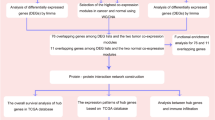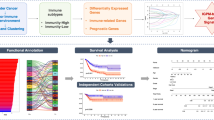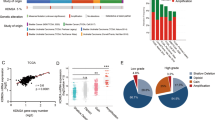Abstract
To identify targets of genetic and epigenetic alterations on chromosome 11p15.5 in human bladder cancer, expression of the imprinted KIP2, IGF2 and H19 genes was studied by quantitative RT-PCR in 24 paired samples of urothelial carcinomas and morphologically normal mucosa obtained by cystectomy, and in bladder carcinoma cell lines. The most frequent alteration in tumour tissue was decreased expression of KIP2 identified in 9/24 (37%) specimens. Decreased IGF2 and H19 mRNA levels were found in five (21%) and three (13%) tumours, respectively. One tumour each overexpressed IGF2 and H19. Loss of H19 expression was only found associated with loss of KIP2 expression, whereas decreased expression of IGF2 mRNA occurred independently. Almost all bladder carcinoma cell lines showed significant changes in the expression of at least one gene with diminished expression of KIP2 mRNA as the most frequent alteration. IGF2 mRNA levels were diminished in several lines, but increased in others. The KIP2 gene could be an important target of genetic and epigenetic alterations in bladder cancer affecting the maternal chromosome 11p15.5. However, reminiscent of the situation in Wilms’ tumours, expression of the IGF2 gene on the paternal chromosome can also be disturbed in bladder cancers. © 2000 Cancer Research Campaign
Similar content being viewed by others
Article PDF
Change history
16 November 2011
This paper was modified 12 months after initial publication to switch to Creative Commons licence terms, as noted at publication
References
An HX, Niederacher D, Picard F, van Roeyen C, Bender HG & Beckmann MW (1996) Frequent allele loss on 9p21–22 defines a smallest common region in the vicinity of the CDKN2 gene in sporadic breast cancer. Genes, Chromosomes Cancer 17: 14–20
Clasen S, Schulz WA, Gerharz CD, Grimm MO, Christoph F & Schmitz-Dräger BJ (1998) Frequent and heterogeneous expression of cyclin-dependent kinase inhibitor WAF1/p21 protein and mRNA in urothelial carcinoma. Br J Cancer 77: 515–521
Cooper MJ, Fischer M, Komitowski D, Shevelev A, Schulze E, Ariel I, Tykocinski ML, Miron S, Ilan J, de Groot N & Hochberg A (1996) Developmentally imprinted genes as markers for bladder tumor progression. J Urol 155: 120–127
Dao D, Walsh CP, Yuan L, Gorelov D, Feng L, Hensle T, Nisen P, Yamashiro DJ, Bestor TH & Tycko B (1999) Multipoint analysis of human chromosome 11p15/mouse distal chromosome 7: inclusion of H19/IGF2 in the minimal WT2 region, gene specificity of H19 silencing in Wilms’ tumorigenesis and methylation hyper-dependence of H19 imprinting. Hum Mol Genet 8: 1337–1352
Elkin M, Shevelev A, Schulze E, Tykocinsky M, Cooper M, Ariel I, Pode D, Kopf E, de Groot N & Hochberg A (1995) The expression of the imprinted H19 and IGF-2 genes in human bladder carcinoma. FEBS Lett 374: 57–61
Gibas Z & Gibas L (1997) Cytogenetics of bladder cancer. Cancer Genet. Cytogenet 95: 108–115
Grimm MO, Jürgens B, Schulz WA, Decken K, Makri D & Schmitz-Dräger BJ (1995) Inactivation of tumor suppressor genes and deregulation of the c-myc gene in urothelial cancer cell lines. Urol Res 23: 293–300
Habuchi T, Ogawa O, Kaekehi Y, Ogura K, Koshiba M, Hamazaki S, Takahashi R, Sugiyama S & Yoshida O (1993) Accumulated allelic losses in the development of invasive urothelial cancer. Int J Cancer 53: 579–584
Hatada I, Inazawa J, Abe T, Nakayama M, Kaneko Y, Jinno Y, Niikawa N, Ohashi H, Fukushima Y, Iida K, Yutani C, Takahashi S, Chiba Y, Ohishi S & Mukai T (1996) Genomic imprinting of human p57KIP2and its reduced expression Wilms’ tumors. Human Mol Genet 5: 783–788
Jürgens B, Schmitz-Dräger BJ & Schulz WA (1996) Hypomethylation of L1 LINE sequences prevailing in human urothelial carcinoma. Cancer Res 56: 5698–5703
Karnik P, Chen P, Paris M, Yeger H & Williams BRG (1998) Loss of heterozygosity at chromosome 11p15 in Wilms tumors: identification of two independent regions. Oncogene 17: 237–240
Kondo M, Matsuoka S, Uchida K, Osada H, Nagatake M, Takagi K, Harper JW, Takahashi T, Elledge SJ & Takahashi T (1996) Selective maternal-allele loss in human lung cancers of the maternally expressed p57KIP2gene at 11p15.5. Oncogene 12: 1365–1368
Lee M-H, Reynisdóttir I & Massagué J (1995) Cloning of p57KIP2, a cyclin-dependent kinase inhibitor with unique domain structure and tissue distribution. Genes Dev 9: 639–649
Lee MP, DeBaun M, Randhawa G, Reichard BA, Elledge SJ & Feinberg AP (1997) Low frequency of p57KIP2mutations in Beckwith-Wiedemann syndrome. Am J Hum Genet 61: 304–309
Lee MP, DeBaun M, Mitsuya K, Galonek HL, Brandenburg S, Oshimura M & Feinberg AP (1999) Loss of imprinting of a paternally expressed transcript, with antisense orientation to KvQLTI, occurs frequently in Beckwith-Wiedemann syndrome and is independent of insulin-like growth factor II imprinting. Proc Natl Acad Sci USA 96: 5203–5208
Leighton PA, Ingram RS, Eggenschwiler J, Efstratiadis A & Tilghman SM (1995) Disruption of imprinting caused by deletion of the H19 gene in mice. Nature 375: 34–39
Liu J, Kahri AI, Heikkila P & Voutilainen R (1997) Ribonucleic acid expression of the clustered imprinted genes, p57KIP2, insulin-like growth factor II, and H19, in adrenal tumors and cultured adrenal cells. J Clin Endocrinol Metab 82: 1766–1771
Matsuoka S, Edwards MC, Bai C, Parker S, Zhang P, Baldini A, Harper JW & Elledge SJ (1995) P57KIP2, a structurally distinct member of the p21CIPICDK inhibitor family, is a candidate tumor suppressor gene. Genes Dev 9: 650–662
Matsuoka S, Thompson JS, Edwards MC, Barletta JM, Grundy P, Kalikin LM, Harper JW, Elledge SJ & Feinberg AP (1996) Imprinting of the gene encoding a human cyclin-dependent kinase inhibitor, on chromosome 11p15. Proc Natl Acad Sci USA 93: 3026–3030
McCann AH, Miller N, O’Meara A, Pedersen I, Keogh K, Gorey T & Dervan PA (1996) Biallelic expression of the IGF2 gene in human breast disease. Hum Mol Genet 5: 1123–1127
Mori M, Inoue H, Shiraishi T, Mimori K, Shibuta K, Nakashima H, Mafune K, Tanaka Y, Ueo H, Barnard GF, Sugimachi K & Akiyoshi T (1996) Relaxation of insulin-like growth factor 2 gene imprinting in esophageal cancer. Int J Cancer 68: 441–446
Moulton T, Crenshaw T, Hao Y, Moosikasuwan J, Lin N, Dembitzer F, Hensle T, Weiss L, McMorrow L, Loew T, Kraus W, Gerad W & Tycko B (1994) Epigenetic lesions at the H19 locus in Wilms’ tumour patients. Nat Genet 7: 440–447
Nonomura N, Nishimura K, Miki T, Kanno N, Kojima Y, Yokoyama M & Okuyama A (1997) Loss of imprinting of the insulin-like growth factor II gene in renal cell carcinoma. Cancer Res 57: 2575–2577
Oda H, Kume H, Shimizu Y, Inoue T & Ishikawa T (1998) Loss of imprinting of IGF2 in renal cell carcinomas. Int J Cancer 75: 343–346
Ogawa O, Eccles MR, Szeto J, McNoe LA, Yun K, Maw MA, Smith PJ & Reeve AE (1993) Relaxation of insulin-like growth factor II gene imprinting implicated in Wilms’ tumour. Nature 362: 749–752
Okamoto K, Morrison IM, Taniguchi T & Reeve AE (1997) Epigenetic changes at the insulin-like growth factor II/H19 locus in developing kidney is an early event in Wilms tumorigenesis. Proc Natl Acad Sci USA 94: 5367–5371
O’Keefe D, Dao D, Zhao L, Sanderson R, Warburton D, Weiss L, Anyane-Yeboa K & Tycko B (1997) Coding mutations in p57KIP2are present in some cases of Beckwith-Wiedmann syndrome but are rare or absent in Wilms tumors. Am J Hum Genet 61: 295–303
Oya M, Schmidt B, Schmitz-Dräger BJ & Schulz WA (1998) Expression of G1 → S transition regulatory molecules in human urothelial cancer. Jap J Cancer Res 89: 719–726
Rainier S, Johnson LA, Dobry CJ, Ping AJ, Grundy PE & Feinberg AP (1993) Relaxation of imprinted genes in human cancer. Nature 362: 747–755
Reid LH, Crider-Miller SJ, West A, Lee M-H, Massagué J & Weissman BE (1996) Genomic organization of the human p57KIP2gene and its analysis in the G401 Wilms’ tumor assay. Cancer Res 56: 1214–1218
Reik W, Brown KW, Schneid H, Le Bouc Y, Bickmore W & Maher ER (1995) Imprinting mutations in the Beckwith-Wiedemann syndrome suggested by an altered imprinting pattern in the IGF2-H19 domain. Hum Mol Genet 4: 2379–2385
Schulz WA, Krummeck A, Rösinger I, Eickelmann P, Neuhaus C, Ebert T, Schmitz-Dräger BJ & Sies H (1997) Increased frequency of a null-allele for NAD(P)H:quinone oxidoreductase in patients with urological malignancies. Pharmacogenetics 7: 235–239
Shaw ME & Knowles MA (1995) Deletion mapping of chromosome 11 in carcinoma of the bladder. Genes Chromosomes Cancer 13: 1–8
Smilinich NJ, Day CD, Fitzpatrick GV, Caldwell GM, Lossie AC, Cooper PR, Smallwood AC, Joyce JA, Schofield PN, Reik W, Nicholls RD, Weksberg R, Driscoll DS, Maher ES, Shows TB & Higgins MJ (1999) A maternally methylated CpG island in KrLQT1 is associated with an antisense paternal transcript and loss of imprinting in Beckwith-Wiedmann Syndrome. Proc Natl Acad Sci USA 96: 8664–8069
Steenman MJ, Rainier S, Dobry CJ, Grundy P, Horon IL & Feinberg AP (1994) Loss of imprinting of IGF2 is linked to reduced expression and abnormal methylation of H19 in Wilms’ tumor. Nat Genet 7: 433–439
Tadokoro K, Fujii H, Inoue T & Yamada M (1991) Polymerase chain reaction (PCR) for detection of ApaI polymorphism at the insulin like growth factor II gene (IGF2). Nucleic Acids Res 19: 6967
Taniguchi T, Sullivan MJ, Ogawa O & Reeve AE (1995) Epigenetic changes encompassing the IGF2/H19 locus associated with relaxation of IGF2 imprinting and silencing of H19 in Wilms’ tumor. Proc Natl Acad Sci USA 92: 2159–2163
Tokino T, Urano T, Furuhata T, Matsushima M, Miyatsu T, Sasaki S & Nakamura Y (1996) Characterization of the human p57KIP2gene: alternative splicing, insertion/deletion polymorphisms in VNTR sequences in the coding region, and mutational analysis. Hum Gen 97: 625–631
Uyeno S, Aoki Y, Nata M, Sagisaka K, Kayama T, Yoshimoto T & Ono T (1996) IGF2 but not H19 shows loss of imprinting in human glioma. Cancer Res 56: 5356–5359
Voorter CEM, Ummelen MIJ, Ramaekers FSC & Hopman AHN (1996) Loss of chromosome 11 and 11 p/q imbalances in bladder cancer detected by fluorescence in situ hybridization. Int J Cancer 65: 301–307
Weksberg R, Shen DR, Fei YL, Song QL & Squire J (1993) Disruption of insulin-like growth factor 2 imprinting in Beckwith-Wiedemann syndrome. Nat Genet 5: 143–150
Zhang P, Wong C, De Pinho RA, Harper JW & Elledge SJ (1998) Cooperation between the Cdk inhibitors p27KIP1and p57KIP2in the control of tissue growth and development. Genes & Dev 12: 3162–3167
Author information
Authors and Affiliations
Rights and permissions
From twelve months after its original publication, this work is licensed under the Creative Commons Attribution-NonCommercial-Share Alike 3.0 Unported License. To view a copy of this license, visit http://creativecommons.org/licenses/by-nc-sa/3.0/
About this article
Cite this article
Oya, M., Schulz, W. Decreased expression of p57KIP2 mRNA in human bladder cancer. Br J Cancer 83, 626–631 (2000). https://doi.org/10.1054/bjoc.2000.1298
Received:
Revised:
Accepted:
Published:
Issue date:
DOI: https://doi.org/10.1054/bjoc.2000.1298
Keywords
This article is cited by
-
p57KIP2 control of actin cytoskeleton dynamics is responsible for its mitochondrial pro-apoptotic effect
Cell Death & Disease (2012)
-
The guardians of the genome (p53, TA-p73, and TA-p63) are regulators of tumor suppressor miRNAs network
Cancer and Metastasis Reviews (2010)
-
CDKN1C/p57kip2is a candidate tumor suppressor gene in human breast cancer
BMC Cancer (2008)
-
p57Kip2 (cdkn1c): sequence, splice variants and unique temporal and spatial expression pattern in the rat pancreas
Laboratory Investigation (2005)
-
Silencing of imprinted CDKN1C gene expression is associated with loss of CpG and histone H3 lysine 9 methylation at DMR-LIT1 in esophageal cancer
Oncogene (2004)



